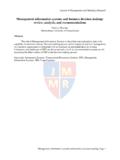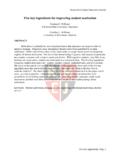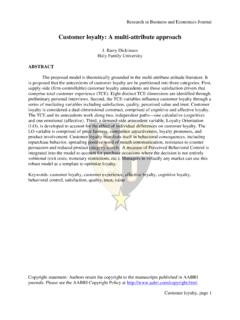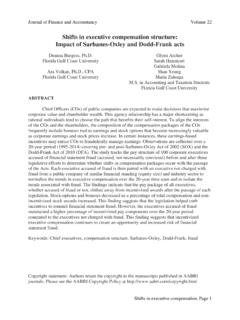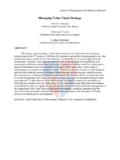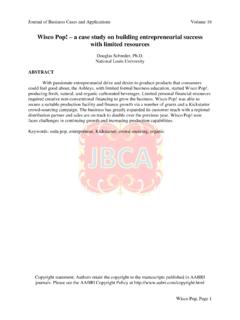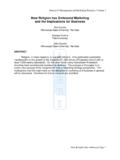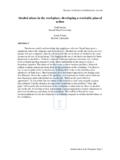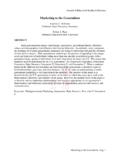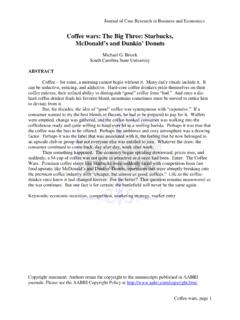Transcription of Adult learning styles and on -line educational preference
1 Adult learning styles and on ABSTRACT The use of on -line instructional delivery methodscontinues to grow as technological and societal changes have enabled and encouraged this growth. The purpose of this paper is to review recent literature with respect to and tie that concept into a discussionand preference towards on -line instructiondiscovered and recommendations are provided based upon these reviews. Keywords: Adult learners, on -line education, e Research in Higher Education Journal Adult learning styles , Page learning styles and on -line educational preference James R. McGlone Liberty University line instructional delivery methods by non-traditional Adult continues to grow as technological and societal changes have enabled and encouraged this paper is to review recent literature with respect to how adults learn to a discussion based upon a review of the suitability of, satisfaction with, line instruction among adults . Some areas for improvementdiscovered and recommendations are provided based upon these reviews.
2 line education, e- learning , student satisfaction, student preferenceResearch in Higher Education Journal Adult learning styles , Page 1 preference traditional Adult learners continues to grow as technological and societal changes have enabled and encouraged this how adults learn , satisfaction with, Some areas for improvement are t satisfaction, student preference INTRODUCTION From the ancient past to the present age, independent intellect. From the earliest understandingsafety needs are taken care of, humans lookhigher level of survival in the worldMan does not simply seek survival at anotherterms, retaining his independence and improving his cap learning (Boyd, 1986). Without a criticalposition of primacy can hinder othersthe political process as an examplewhatever the politicians told them, (or in other words, failed to retain their indethink) the result would be a downward spiral of democratic quality that some form of despotic dictatorship. enters into this conflict of ideas, it is uperceive these ideas.
3 This is perhaps one of the reasons that a life-long pursuit. This is also the reason that educators ofbest possible products and programs to allow Adult learners the best possible learn. These must be provided in the best format possible for their individual learning styles and educational needs. In short; if Adult learners ar always be right with respect to their institutions charged with providing these experiences need to be prepared to adapt and evolve as the technology that supports this learning evolves. One way that governmental agencies have attempted to embrace this concept of the critically thinking Adult , is through advancing the concept of the European Union (EU), Britain (in particulaon -line learning technologies in nationalresearch suggests that these efforts can lead to a hollow learning atmosphere which is not amenable to its stated goals. In one such studythree main elements: (1) governmental influence, underestimation of the potential of this technology, and finally, effort to improve the quality of the education received this way that has not fully been embraced by the on -line education community (Yang, 2008).)
4 The result of all this combines to create a shallow, low quality learning experience the classroom experience (2008). Ultimately, in this case, the researcher finds that what is lacking among the implementers of lifelong on594). Looking at similar programs and efforts by the emerging nations of the EUresearch effort out of Turkey found a similarly shallow set of goals, policies and standards(Demirbilek, 2009). The recommendations in this case included implementing improvementsInformation and Communication Technology (ICT) hardware and software as well as increasing cooperation between institutions and countries (2009). QUESTIONS TO CONSIDER Do non-traditional Adult learners have learning styles which are conducive to the use of on -line educational opportunities? Do Research in Higher Education Journal Adult learning styles , Page From the ancient past to the present age, adults have strived to improve their own the earliest understanding, it has been identified that once , humans look for something more in an attempt towards reaching a higher level of survival in the world.
5 However, education may very well be about the fact that survival at another man s whim; Man wishes to survive on his own terms, retaining his independence and improving his capacity for independent action or, in effect, Without a critical- analysis of their viewpoints by others, thinkers in a others ability to retain their independence of an example: If a largely uneducated Adult voter-base simply believed whatever the politicians told them, (or in other words, failed to retain their independent ability to think) the result would be a downward spiral of democratic quality that could ultimately lead to dictatorship. In short; the world of ideas is a world of conflict. As conflict of ideas, it is useful to have a larger base of knowledge from which to perhaps one of the reasons that learning has often been described as the reason that educators of adults must continue tobest possible products and programs to allow Adult learners the best possible opportunities toin the best format possible for their individual learning styles and In short; if Adult learners are the customers, then the customer right with respect to their critiques of online learning experiences.
6 Einstitutions charged with providing these experiences need to be prepared to adapt and evolve as supports this learning evolves. One way that governmental agencies have attempted to embrace this concept of the critically thinking Adult , is through advancing the concept of the lifelong learnerEuropean Union (EU), Britain (in particular), and China have adopted policies which embrace national efforts to promote this concept. However, research suggests that these efforts can lead to a hollow learning atmosphere which is not n one such study focusing on China, it is noted that thovernmental influence, (2) overenthusiasm combined with underestimation of the potential of this technology, and finally, (3) a renewed and continuing effort to improve the quality of the education received this way that has not fully been embraced community (Yang, 2008). The result of all this combines to create a shallow, low quality learning experience with little educational value-added when compared to.
7 Ultimately, in this case, the researcher finds that what is lacking among the implementers of lifelong on -line learning is simply, Vision at similar programs and efforts by the emerging nations of the EUresearch effort out of Turkey found a similarly shallow set of goals, policies and standardsThe recommendations in this case included implementing improvementsInformation and Communication Technology (ICT) hardware and software as well as increasing cooperation between institutions and countries (2009). R traditional Adult learners have learning styles which are conducive to the use of line educational opportunities? Do their learning styles lead to a preference towards the more Research in Higher Education Journal Adult learning styles , Page 2 their own , it has been identified that once their basic in an attempt towards reaching a about the fact that whim; Man wishes to survive on his own acity for independent action or, in effect, analysis of their viewpoints by others, thinkers in a independence of thought.
8 Consider base simply believed pendent ability to ould ultimately lead to In short; the world of ideas is a world of conflict. As one seful to have a larger base of knowledge from which to learning has often been described as continue to develop the opportunities to in the best format possible for their individual learning styles and e the customers, then the customer might just . educational institutions charged with providing these experiences need to be prepared to adapt and evolve as One way that governmental agencies have attempted to embrace this concept of the lifelong learner . Indeed, the and China have adopted policies which embrace to promote this concept. However, some recent research suggests that these efforts can lead to a hollow learning atmosphere which is not focusing on China, it is noted that their effort has verenthusiasm combined with renewed and continuing effort to improve the quality of the education received this way that has not fully been embraced community (Yang, 2008).
9 The result of all this combines to create a added when compared to . Ultimately, in this case, the researcher finds that what is (Yang, 2008, p. at similar programs and efforts by the emerging nations of the EU; a recent research effort out of Turkey found a similarly shallow set of goals, policies and standards The recommendations in this case included implementing improvements in Information and Communication Technology (ICT) hardware and software as well as increasing traditional Adult learners have learning styles which are conducive to the use of nce towards the more self-paced delivery of on -line education? are mentioned whereby teachers aout problems on their own. This method seems to support or recognize the value of constructivist theory. Under this constructivist canother, as they work out math or writing projects. In addition, many of the materials referenced for the subject of differentiated instruction, are deeply rooted in cognitive theory.)
10 Refer back to cognitive theory for these efforts is that many of the methods proposed are attempting to get people to access their memory functions and build upon memory pathways. This is especially poignant with Adult learners who theoretically would have memory pathways from which to build but, as they age, may have trouble accessing these pathways without proper mental exercise . must first review some recent literature and seek to destyles of adults , are these consistent in constructivist and cognitive ways that onoften conducted and finally, are Adult students satisfied and educational activities after they first experience the current state of the art ? LITERATURE REVIEW As mentioned above, by looking at the characteristics of how adults learn new material or concepts, the theory of andragogy become more prevalent in the past thirty to forty years. Thlearning basically recognizes that adults have, and seek to develop, independence in their method of learning .
